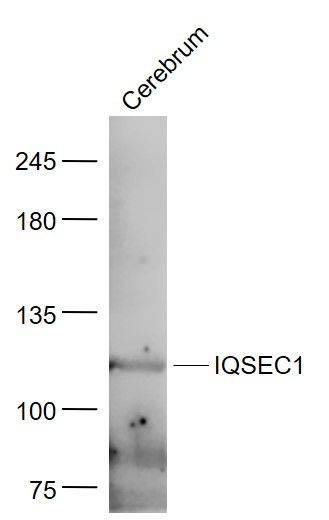GEP100/IQSEC1 Polyclonal Antibody
Purified Rabbit Polyclonal Antibody (Pab)
- SPECIFICATION
- CITATIONS
- PROTOCOLS
- BACKGROUND

Application
| WB, IHC-P, IHC-F, IF, ICC, E |
|---|---|
| Primary Accession | Q6DN90 |
| Reactivity | Rat, Pig, Dog |
| Host | Rabbit |
| Clonality | Polyclonal |
| Calculated MW | 108 KDa |
| Physical State | Liquid |
| Immunogen | KLH conjugated synthetic peptide derived from human GEP100 |
| Epitope Specificity | 451-550/963 |
| Isotype | IgG |
| Purity | affinity purified by Protein A |
| Buffer | 0.01M TBS (pH7.4) with 1% BSA, 0.02% Proclin300 and 50% Glycerol. |
| SUBCELLULAR LOCATION | Cytoplasm. Nucleus. At steady state, may be preferentially cytosolic. |
| SIMILARITY | Belongs to the BRAG family. Contains 1 IQ domain. Contains 1 PH domain. Contains 1 SEC7 domain. |
| Important Note | This product as supplied is intended for research use only, not for use in human, therapeutic or diagnostic applications. |
| Background Descriptions | The ADP-ribosylation factor (ARF) protein family are structurally and functionally conserved members of the Ras superfamily of regulatory GTP-binding proteins. ARFs influence vesicle trafficking and signal transduction in eukaryotic cells. ARF6 plays a role in protein trafficking near the plasma membrane, including receptor recycling, cell adhesion and cell migration. ARF6 colocalizes with the ARF guanine nucleotide-exchange protein (GEP) BRAG2, also designated GEP100. BRAG2 is ubiquitously expressed as two isoforms, BRAG2a and BRAG2b, which can cycle between the cytoplasm and the nucleus. BRAG2, via its interaction with ARF6, is involved in the regulation of cell adhesion by controlling Integrin ∫1 endocytosis and E-cadherin redistribution. BRAG2 has also been shown to bind directly to Tyr1068/1086-phosphorylated EGFR to activate ARF6, which induces tumor invasion in MCF7 cells. Therefore, BRAG2 may contribute to the metastasis and malignancy of some breast cancer cells. |
| Gene ID | 9922 |
|---|---|
| Other Names | IQ motif and SEC7 domain-containing protein 1, ADP-ribosylation factors guanine nucleotide-exchange protein 100, ADP-ribosylation factors guanine nucleotide-exchange protein 2, Brefeldin-resistant Arf-GEF 2 protein, BRAG2, IQSEC1 (HGNC:29112) |
| Target/Specificity | Expressed in brain, ovary, heart, lung, liver, kidney and leukocytes. Moderate expression was also detected in lung, skeletal muscle, placenta, small intestine, pancreas, spleen and testis. |
| Dilution | WB=1:500-2000,IHC-P=1:100-500,IHC-F=1:100-500,ICC=1:100-500,IF=1:100-500,ELISA=1:5000-10000 |
| Storage | Store at -20 ℃ for one year. Avoid repeated freeze/thaw cycles. When reconstituted in sterile pH 7.4 0.01M PBS or diluent of antibody the antibody is stable for at least two weeks at 2-4 ℃. |
| Name | IQSEC1 (HGNC:29112) |
|---|---|
| Function | Guanine nucleotide exchange factor for ARF1 and ARF6 (PubMed:11226253, PubMed:24058294). Guanine nucleotide exchange factor activity is enhanced by lipid binding (PubMed:24058294). Accelerates GTP binding by ARFs of all three classes. Guanine nucleotide exchange protein for ARF6, mediating internalization of beta-1 integrin (PubMed:16461286). Involved in neuronal development (Probable). In neurons, plays a role in the control of vesicle formation by endocytoc cargo. Upon long term depression, interacts with GRIA2 and mediates the activation of ARF6 to internalize synaptic AMPAR receptors (By similarity). |
| Cellular Location | Cytoplasm. Nucleus. Postsynaptic density {ECO:0000250|UniProtKB:Q8R0S2}. Cytoplasmic vesicle, secretory vesicle, synaptic vesicle {ECO:0000250|UniProtKB:Q8R0S2}. Note=At steady state, may be preferentially cytosolic |
| Tissue Location | Expressed in brain, ovary, heart, lung, liver, kidney and leukocytes. Moderate expression was also detected in lung, skeletal muscle, placenta, small intestine, pancreas, spleen and testis. |

Thousands of laboratories across the world have published research that depended on the performance of antibodies from Abcepta to advance their research. Check out links to articles that cite our products in major peer-reviewed journals, organized by research category.
info@abcepta.com, and receive a free "I Love Antibodies" mug.
Provided below are standard protocols that you may find useful for product applications.
If you have used an Abcepta product and would like to share how it has performed, please click on the "Submit Review" button and provide the requested information. Our staff will examine and post your review and contact you if needed.
If you have any additional inquiries please email technical services at tech@abcepta.com.













 Foundational characteristics of cancer include proliferation, angiogenesis, migration, evasion of apoptosis, and cellular immortality. Find key markers for these cellular processes and antibodies to detect them.
Foundational characteristics of cancer include proliferation, angiogenesis, migration, evasion of apoptosis, and cellular immortality. Find key markers for these cellular processes and antibodies to detect them. The SUMOplot™ Analysis Program predicts and scores sumoylation sites in your protein. SUMOylation is a post-translational modification involved in various cellular processes, such as nuclear-cytosolic transport, transcriptional regulation, apoptosis, protein stability, response to stress, and progression through the cell cycle.
The SUMOplot™ Analysis Program predicts and scores sumoylation sites in your protein. SUMOylation is a post-translational modification involved in various cellular processes, such as nuclear-cytosolic transport, transcriptional regulation, apoptosis, protein stability, response to stress, and progression through the cell cycle. The Autophagy Receptor Motif Plotter predicts and scores autophagy receptor binding sites in your protein. Identifying proteins connected to this pathway is critical to understanding the role of autophagy in physiological as well as pathological processes such as development, differentiation, neurodegenerative diseases, stress, infection, and cancer.
The Autophagy Receptor Motif Plotter predicts and scores autophagy receptor binding sites in your protein. Identifying proteins connected to this pathway is critical to understanding the role of autophagy in physiological as well as pathological processes such as development, differentiation, neurodegenerative diseases, stress, infection, and cancer.


